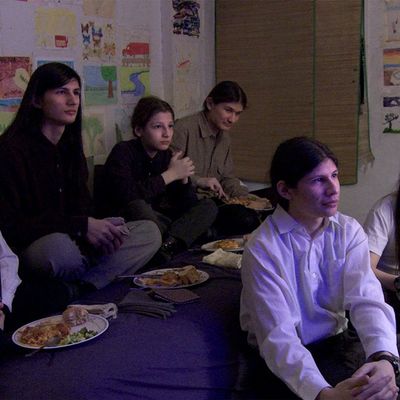
When Crystal Moselle stumbled on the subjects of her documentary The Wolfpack ÔÇö the six Angulo brothers of New YorkÔÇÖs Lower East Side, prisoners (along with a mentally disabled sister) of a father who allowed them no public schooling, no friends, few trips beyond the bolted door of their small apartment in a dangerous project, no connection with the outside world apart from DVDs of mostly violent movies ÔÇö there should have been a thunderclap in the heavens. This is the rare ÔÇ£profileÔÇØ documentary that is also a transcendent work of art. It raises questions weÔÇÖll be trying to answer for as long as there is art.
Its a grueling film  it feels longer than its 84 minutes  but its buoyed by the spirit of  Quentin Tarantino, of all people. Moselle introduces the Angulo boys (all named after forms of the god Krishna) in dark suits and sunglasses, swaggering through scenes from Reservoir Dogs with dialogue theyve meticulously transcribed from DVDs and VHS tapes. They stage a rite that features Freddy Krueger, Michael Myers, Jason Voorhees, and other slashers. The costumes, made from scraps of this and that, nail the essence of characters: An uncannily evocative Batman suit turns out to have been fashioned from cereal boxes and yoga mats. David Lynchs Blue Velvet looms large, evidently beckoning the boys with its vision of a woman who is both a fetishistic object and a victim.
It would seem that movies ÔÇö even nasty, violent, pulp movies ÔÇö have given them the ability to make imaginative leaps and, as a consequence, to develop an astonishingly mature perspective on the cruelty of their situation.
They trace the history of that situation while their Peruvian father, Oscar, remains in his bedroom ÔÇö a recluse, rarely displaying the grandiosity or towering rages that disfigured his wifeÔÇÖs and childrenÔÇÖs lives. His boys explain that after he married their mother, Susanne, a midwestern American, he discovered Hare Krishna and decided socialization was destructive. He believed work made one a slave to society ÔÇö a robot. He said he was a god. The aged gnome we meet can barely speak English and is probably an alcoholic. He stammers that it ÔÇ£doesnÔÇÖt matter what you doÔÇØ in life, itÔÇÖs what you are ÔÇö which neatly allows him to evade responsibility for his actions. Circumstances dictate fate, he says. Jesus Christ would forgive him.
His children might not. Watching them move into the ÔÇ£realÔÇØ world ÔÇö riding subways, seeing a movie in a theater for the first time (The Fighter), splashing in the waves off Coney Island ÔÇö is thrilling, heartbreaking, confounding. They are, for one thing, such exotic creatures, dark and hooded but rangy and open, a mix of two sets of disparate genes that still seem to be getting to know each other. Sand on the beach reminds them of Lawrence of Arabia, a stand of trees a forest from Lord of the Rings. But they have spent so much time in their own heads and in front of screens. They are still learning how to see.
I have written of this wolf pack as if its members were interchangeable, but each is his own man and will evolve differently from his brother. What they share is a point of reference. MoselleÔÇÖs cinematic coup is the boysÔÇÖ filming of a ghoulish pageant redolent of Lynch, M├®li├¿s ÔÇö stuff that seems dredged up from the unconscious of movie lovers. Critics of violent cinema ÔÇö even those who, like me, love pulp and give lip service to the notion of catharsis ÔÇö often lament its coarsening effect on the young and impressionable. The Wolfpack is a reminder that much of the ÔÇ£crapÔÇØ we decry has the potential to liberate, offering a bridge off the island of terror we call the nuclear family.
*This article appears in the June 1, 2015 issue of New York Magazine.


